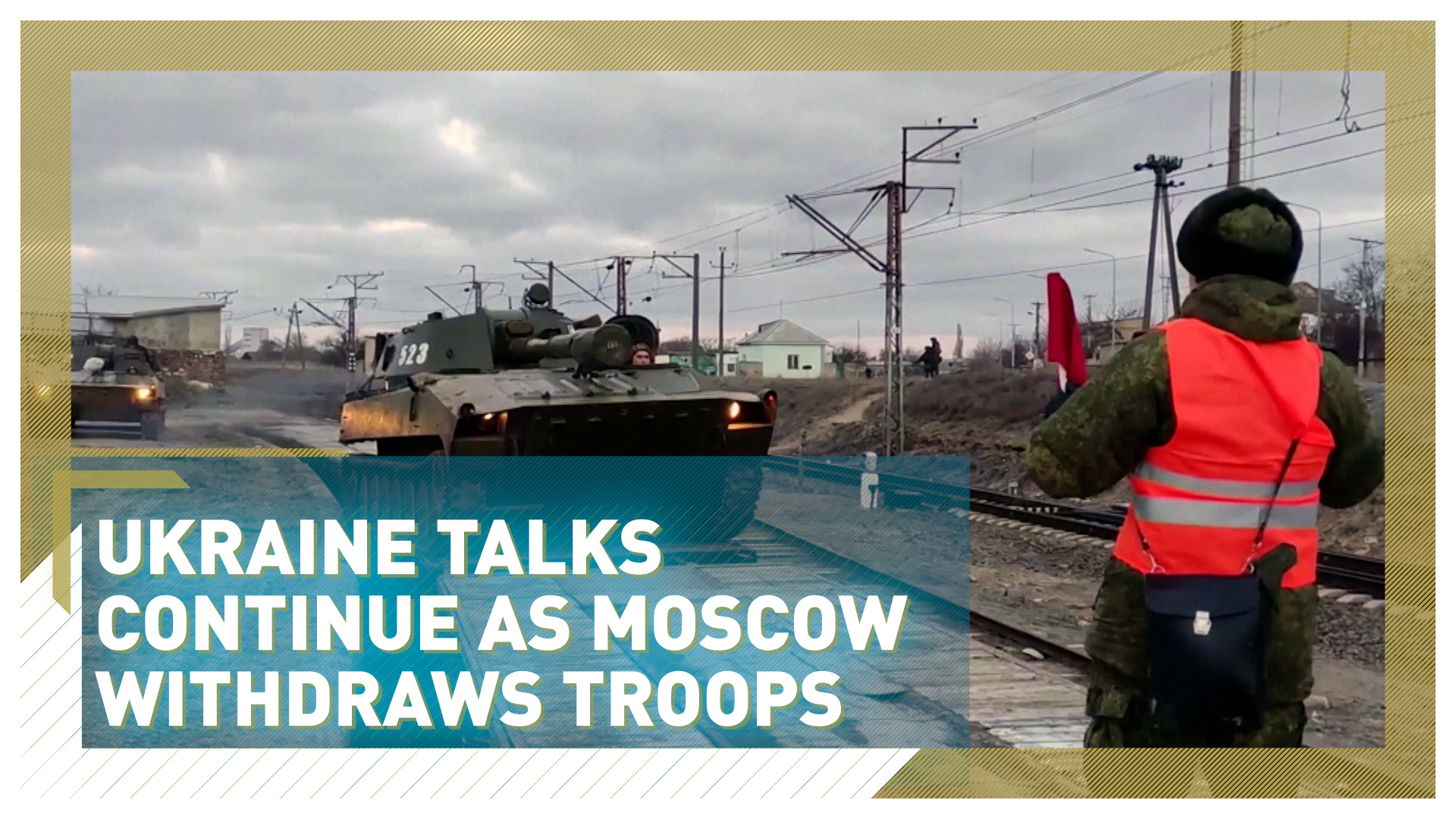03:13

U.S. Secretary of State Antony Blinken said that no evidence had been seen of a significant Russian withdrawal of its military forces from Ukraine's border.
This is despite Moscow's claim on Tuesday that some Russian troops would be returning to their permanent bases after time along the Ukrainian border, which has been raising concerns of an impending Russian invasion, concerns the Kremlin dismisses as baseless.
"There's what Russia says, and then there's what Russia does. And we haven't seen any pullback of its forces," Blinken told MSNBC. "We continue to see critical units moving toward the border, not away from the border.”
"So what we need to see is exactly the opposite. We need to see these forces moving away."
Ahead of talks between German chancellor Olaf Scholz was set to meet with his Russian counterpart Vladimir Putin, the spokesperson for Russia's Ministry of Defence announced that units were returning "to their military garrisons," a move some considered as the first significant step towards de-escalating tensions between Russia, Ukraine, and NATO.
"That we are now hearing that some troops are being withdrawn is a good sign," said Scholz in a joint press conference with the Russian President.

Soldiers of the 82nd Airborne Division walk to board a plane from Pope Army Airfield in Fort Bragg, North Carolina for deployment to Europe. /Allison Joyce/AFP
Soldiers of the 82nd Airborne Division walk to board a plane from Pope Army Airfield in Fort Bragg, North Carolina for deployment to Europe. /Allison Joyce/AFP
"The diplomatic options are far from exhausted. The task now must be to work resolutely and courageously towards a peaceful resolution of this crisis.”
President Putin agreed that he was open to more talks, "we are ready to work further together," he said.
"We are ready to go down the negotiations track but all the issues, as stated earlier, should be considered as a whole."
Moscow has given NATO a list of demands that include reducing the Western alliance's presence in eastern Europe and providing a binding promise that Ukraine would never become a member.
But many are still skeptical of Putin's promises.
Following the announcement of a troop drawdown, Ukraine's minister of foreign affairs said he was used to Russia "giving different statements."
"So we have a rule: don't believe what you hear, believe what you see, announced Dmytro Kuleba in a video message.
"When we see a withdrawal, we will believe in a de-escalation.”

A Russian tank leaves the border after joint exercises of the armed forces of Russia and Belarus as part of an inspection of the Union State's Response Force. /Handout/Russian Defence Ministry/AFP
A Russian tank leaves the border after joint exercises of the armed forces of Russia and Belarus as part of an inspection of the Union State's Response Force. /Handout/Russian Defence Ministry/AFP
In the Ukrainian capital Kyiv, residents were also skeptical.
Artem Zaluznyi, a lawyer who lives in the city, recited a popular Ukrainian proverb, "to promise to marry and to get married are two different things. From the side of the aggressor country, they have already been violations of the agreements.”
France's foreign minister, Jean-Yves Le Drian, also asked Moscow for action.
"In the last few hours, I have seen a few changes of heart," he said, speaking in the French parliament on Tuesday. "Both on the dialogue to be resumed and on the potential withdrawal of certain military units. Words are good, we are waiting for actions."
Words echoed by his German counterpart Anna Baerbock. Last week she was in the Ukrainian capital and visited a frontline community devastated by eight years of war with Russian-backed separatists.
"Every genuine step towards de-escalation would be a reason for hope," she told journalists during a press conference in Madrid, Spain.
"Until now, there have only been announcements, and we now need actions and not just words. We need a show of trust."
Yet her own government's loyalties to the Ukraine crisis have also been questioned.

A drone carries a Ukrainian National flag above the Independence Square to mark a "Day of Unity" in Kyiv, Ukraine. /Sergei Chuzakov/AFP
A drone carries a Ukrainian National flag above the Independence Square to mark a "Day of Unity" in Kyiv, Ukraine. /Sergei Chuzakov/AFP
Berlin has faced criticism for refusing to send weapons to Kyiv and for not including the Nord Stream 2 pipeline in a package of sanctions against Moscow should it invade.
While the EU foreign policy chief Josep Borrell has said that the gas pipeline between Russia and Germany would not go ahead if Russia attacked, Berlin has been reluctant to back that position.
However, Berlin has been Ukraine's largest financial supporter since 2014. It has also recently sent military reinforcements, including troops to Lithuania to support its NATO allies, and has pledged a further $170 million loan to Kyiv.
The German Chancellor's visit to Moscow came as U.S. intelligence warned that Moscow could invade its western neighbor as early as Wednesday after building more than 100,000 troops around Ukraine's border. The day has now been called "a day of Unity."
The Kremlin, officials, and Russian public figures made fun of Western media for running with February 16 as the "invasion date" when Russia might attack Ukraine.
"I'd like to ask if U.S. and British sources of disinformation... could publish the schedule of our upcoming invasions for the year. I'd like to plan my holidays," Russia's foreign ministry spokeswoman Maria Zakharova wrote on social media.

